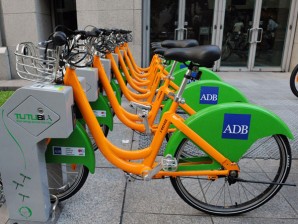
Some of the “Tutubi” bicycles unveiled by the Asian Development Bank in its headquarters in Mandaluyong City on Tuesday, Nov. 6, 2012. PHOTO FROM ADB
This “dragonfly” is not an insect.
Instead of wings, it has a handlebar. Instead of legs, it has two wheels.
“Tutubi,” the name of the bug kids love to catch at playtime, is the moniker of a green transport project involving a fleet of bicycles concocted in the Asian Development Bank (ADB) and unveiled in its headquarters in Mandaluyong City on Tuesday.
Bradley Schroeder, an ADB transport consultant, said the project would promote one very important trait—sharing. In the process, it could help reduce carbon emissions in heavily polluted and traffic-clogged urban centers, he said.
“Bicycle-sharing is a network of bicycles that are available to the public,” Schroeder told reporters.
The idea was broached during the opening day of the biannual three-day Transport Forum 2012 discussing key issues in the public and private vehicular system in Asia and the Pacific—air pollution, climate change and road safety, among others.
The ADB has yet to introduce the system in Manila, but several units are to be deployed in Davao City.
So far, there are 20 “Tutubi” units, but the ADB said that the number could increase to 500 or even 1,000, depending on the outcome of talks with the government.
The name Tutubi was adopted because of its local flavor and is catchy to Filipinos.
According to Schroeder, a similar system is already in place in Guangzhou, Montreal and Paris.
Instead of using motorized vehicles that increase greenhouse gas emissions, people could take to the bikes and by pedaling instead of motoring, they could help address pollution, traffic problems and accidents resulting from rapid urbanization, he said.
In his remarks to the gathering, ADB president Haruhiko Kuroda pegged the number of people added to Asian cities from 1980 to 2010 to “more than a billion,” with another billion “set to be city dwellers” by 2040.
Mind-boggling
Transport could be a mind-boggling problem.
“This is the first time that bicycle-sharing has been brought to the Philippines,” Schroeder said. “We are going to talk to the government, around the neighborhood, around Manila showing them how it works, showing to Filipino families how it works, how easy it is, how safe it is.”
Under the program, stations would be set up where a bicycle could be accessed by a person using a smart card. Users could use a bike for free for a given period. After this, they could be charged a fee.
“When I take the bike, I can park it in another station. I can do this anytime I want,” said Schroeder.
There could be as many as 100 stations, depending on arrangements with the government.
What about bike thieves?
“When you register, you put your details in the card. Every time you use the card, the system, because it works off the Internet, (allows the operator) to know the time you took the bicycle and the bicycle you took. And if you don’t return it, I know who you are,” he said.
Like the dragonfly, you can be easily caught.


